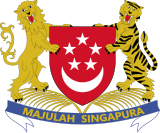| |||||||||||||||||||||||||||||||||||||||||
All 93 directly elected seats in Parliament (and up to 12 NCMPs) | |||||||||||||||||||||||||||||||||||||||||
|---|---|---|---|---|---|---|---|---|---|---|---|---|---|---|---|---|---|---|---|---|---|---|---|---|---|---|---|---|---|---|---|---|---|---|---|---|---|---|---|---|---|
| Registered | 2,651,435[1] | ||||||||||||||||||||||||||||||||||||||||
| Turnout | 95.81% ( | ||||||||||||||||||||||||||||||||||||||||
| |||||||||||||||||||||||||||||||||||||||||
 Results by constituency | |||||||||||||||||||||||||||||||||||||||||
| |||||||||||||||||||||||||||||||||||||||||
| This article is part of a series on |
 |
|---|
|
|
General elections were held in Singapore on Friday, 10 July 2020 to elect 93 members[c] to the Parliament of Singapore across 31 constituencies.[d] Parliament was dissolved and the general election called by President Halimah Yacob on 23 June, on the advice of Prime Minister Lee Hsien Loong.[2] It elected members of parliament to the 14th Parliament of Singapore since Singapore's independence in 1965, using the first-past-the-post electoral system.[3][4]
The elections were the eighteenth general elections in Singapore and the thirteenth since independence.[5] The ruling People's Action Party (PAP) secured its 15th consecutive term in government since 1959, setting the second-longest uninterrupted record among countries with universal suffrage of 66 years if the PAP finishes their full term of five years, behind Mexico's Institutional Revolutionary Party which held power for 71 consecutive years.
The results saw the ruling PAP winning 83 elected seats with the Workers' Party (WP) winning the remaining 10. The WP successfully retained their wards of Aljunied GRC and Hougang SMC and captured the newly created Sengkang GRC, constituting the most opposition seats in Parliament since 1966. Sengkang GRC was notably the second GRC won by the WP,[6] the first time the opposition claimed multiple GRCs since the creation of the scheme in 1988, and also the first time a newly created constituency was won by an opposition party on its first attempt.[7]
While the PAP managed to secure another supermajority victory, this election had also led to inroads for non-PAP parties. With the WP polling 50.49% in the 21 seats it contested in a straight fight with the PAP, the 2020 general election marked the first time since 1963 that the ruling PAP lost the popular vote overall in constituencies contested by the WP and the very first time since independence. In addition, it was also the first election whereby there were more than 1 million valid voters that voted against or cast an invalid/blank vote instead of the PAP.[e]
- ^ Elections Department (15 July 2020). "Press Release on Total Votes Cast at Singapore General Election 2020" (PDF). Archived (PDF) from the original on 20 July 2020. Retrieved 15 July 2020.
- ^ Elections Department (23 June 2020). "Press Release on General Election 2020" (PDF). Archived (PDF) from the original on 25 June 2020. Retrieved 23 June 2020.
- ^ Parliamentary Elections (Prescribed Date) Order 2020 (PDF) (Subsidiary Legislation Supplement S 157). Republic of Singapore Government Gazette. 2020. Archived (PDF) from the original on 24 June 2020. Retrieved 24 June 2020.
- ^ Sugam Pokharel; Nectar Gan (11 July 2020). "Singapore's ruling party stays in power, but support has waned". CNN.
- ^ "Singapore's ruling party calls an election". The Economist. The Economist Newspaper Limited. 25 June 2020. Archived from the original on 26 June 2020. Retrieved 27 June 2020.
- ^ HistoryYogi (11 July 2020). "The ten seats won by WP in #GE2020 marks the first time we've had that many fully elected opposition MPs since January 1966 when there were 10 Barisan MPs. Barisan merged with WP in 1988, so in a way, history has come full circle. #historynerd". Archived from the original on 11 July 2020. Retrieved 11 July 2020.
- ^ "GE2020: PAP wins with 61.24% of vote; WP claims two GRCs including new Sengkang GRC". CNA. Retrieved 27 July 2020.
Cite error: There are <ref group=lower-alpha> tags or {{efn}} templates on this page, but the references will not show without a {{reflist|group=lower-alpha}} template or {{notelist}} template (see the help page).


